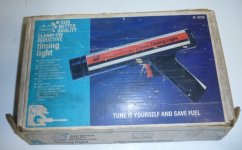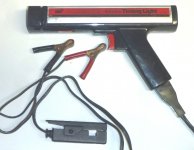This is an interesting discussion about timing lights. Years ago, I bought a used (eBay) Craftsman advance timing light for Chevy projects. The model number is 161.2194. It does seem to be a quality tool, with the case made of real metal. Most likely, this isn't the only model of advance timing lights made by Craftsman over the years.
-
 Hi Guest!
Hi Guest!
If you appreciate British Car Forum and our 25 years of supporting British car enthusiasts with technical and anicdotal information, collected from our thousands of great members, please support us with a low-cost subscription. You can become a supporting member for less than the dues of most car clubs.
There are some perks with a member upgrade!**Upgrade Now**
(PS: Subscribers don't see this gawd-aweful banner

Tips
- We have a special forum called "Member Articles" where you can submit actual articles for consideration for publication. Learn More
- Don't have an Avatar? If not, your avatar will default to the 1st character in your username. Go into "Account Details" to change your Avatar.
- Some basic forum navigation info: click
Hey - did you know if you click on the title of a thread it will take you to the first unread post since you last visited that thread?
- Hey Guest - Is your British Car Club in our Clubs database? If not, send me a PM - Basil

- Looking for a local club? Click the "Clubs" tab above and browse hundreds of clubs world-wide.
- Add Android or iPhone APP: click
- Did you know - any picture or video you add in your posts in any marque-specific forum will also get added to the Media Gallery automatically.
- A few more tips about posting and replying: click
- Hey there Guest - be sure to keep your profile page up to date with interesting info about yourself: learn more
- More tips and tricks on Posting and Replying: click
 STOP!! Never post your email address in open forums. Bots can "harvest" your email! If you must share your email use a Private Message or use the
STOP!! Never post your email address in open forums. Bots can "harvest" your email! If you must share your email use a Private Message or use the  smilie in place of the real @
smilie in place of the real @
- Want to mention another member in a post & get their attention? WATCH THIS

- So, you created a "Group" here at BCF and would like to invite other members to join? Watch this!
- Hey Guest - A post a day keeps Basil from visiting you in the small hours and putting a bat up your nightdress!
- Hey Guest - do you know of an upcoming British car event?
 Pretty Please - add it to our Events forum(s) and add to the calendar! >> Here's How <<
Pretty Please - add it to our Events forum(s) and add to the calendar! >> Here's How << 
- Hey Guest - you be stylin'
Change the look and feel of the forum to fit your taste. Check it out
- If you run across an inappropriate post, for example a post that breaks our rules or looks like it might be spam, you can report the post to the moderators: Learn More
- If you would like to try some different "looks" or styles for the site, scroll to the very bottom, on the left and click the Style Selector.
You are using an out of date browser. It may not display this or other websites correctly.
You should upgrade or use an alternative browser.
You should upgrade or use an alternative browser.
Ignition Timing Issue
- Thread starter RDKeysor
- Start date
DerekJ
Luke Skywalker
Offline
Bob, Thanks for the compliment, but I'm not a pro! Just somebody who has been around Healeys and tries to learn from the pros. Don't believe everything I say  .
.
I became a convert to Pertronix (actually Powerspark is the variant I use) after it completely cured the slight hesitation I was experiencing at high revs. I'm pretty sure it was due to a worn shaft in the distributor. I can buy them in the UK for £29 so its not an issue having a couple of spares in case they fail. No problems up to now though. Prior to that I was a supporter of points for originality and the belief that adjusting them was all part of the classic experience. Which it is of course.
 .
.I became a convert to Pertronix (actually Powerspark is the variant I use) after it completely cured the slight hesitation I was experiencing at high revs. I'm pretty sure it was due to a worn shaft in the distributor. I can buy them in the UK for £29 so its not an issue having a couple of spares in case they fail. No problems up to now though. Prior to that I was a supporter of points for originality and the belief that adjusting them was all part of the classic experience. Which it is of course.
Keoke
Great Pumpkin
Offline
Taken from the Innova manual I found online:
"Some ignition systems and/or specialty spark plug wires (solid core wires, racing wires, off road wires) radiate above normal ElectroMagneticInterference (EMI) and RadioFrequency Interference (RFI) which can cause improper operation of testing equipment. Contact the manufacturers of these parts for instructions on how to use an inductive pickup with their systems."
I'm not an EE--and I don't play one on TV--but this makes no sense .
WOT!!:-
Bob!! This is-Absolute Gospel--- ------Keoke
------Keoke
BOB, has an older, clamp-on style Craftsman advance meter--timing light with dial-in advance, and a metal case--that works fine with copper stranded wires .
YEP
those type lights with metal cases will shield their sensitive electronic circuits from the radiated Electromagnetic Interference generated by UNSUPPRESSED ignition wires.
Some relief might also be obtained using Suppression Spark plugs with the unsuppressed ignition wire . My Snap-on in a red plastic case and suppressed spark plugs works a treat
with my Bumble Bee wire.
"Some ignition systems and/or specialty spark plug wires (solid core wires, racing wires, off road wires) radiate above normal ElectroMagneticInterference (EMI) and RadioFrequency Interference (RFI) which can cause improper operation of testing equipment. Contact the manufacturers of these parts for instructions on how to use an inductive pickup with their systems."
I'm not an EE--and I don't play one on TV--but this makes no sense .
WOT!!:-
Bob!! This is-Absolute Gospel---
 ------Keoke
------KeokeBOB, has an older, clamp-on style Craftsman advance meter--timing light with dial-in advance, and a metal case--that works fine with copper stranded wires .
YEP
those type lights with metal cases will shield their sensitive electronic circuits from the radiated Electromagnetic Interference generated by UNSUPPRESSED ignition wires.
Some relief might also be obtained using Suppression Spark plugs with the unsuppressed ignition wire . My Snap-on in a red plastic case and suppressed spark plugs works a treat
with my Bumble Bee wire.
Last edited:
Offline
I suspect your problem isn't timing but some other electrical ignition issue or fuel delivery. You were probable pretty good at the original setting. There are instructions for setting timing by ear that suggest advancing while the car is running at idle until maximum idle is reached, backing off slightly, then tuning by ear to ensure the car isn't "pinking". 300 rpm is more than slightly and an overly retarded engine will run pretty well but make less power and run hotter as it sounds like yours did). I tuned my British cars this way for years before I had a timing light and still do to some extent. No problems.
D
Deleted member 19315
Guest
Guest
Offline
Being new to Healey but not classic cars, I'm having trouble understanding the approach to ignition timing where one sets by feel. Surely the risk of burnt valves or damaged pistons due to a poor "ear" is such that base and max advance are best set with a light once one establishes exactly where tdc is ? I set my motor timing to the book after setting dwell (mallory twin points) and plug gaps and tappet clearance. Then I balanced the carbs with vac gauges and set mixtures with a colour tune . It runs great.
Always learning.
Andy
Always learning.
Andy
Bob_Spidell
Yoda
Offline
The advance meter (timing light with adjustable advance setting) I have that works with stranded copper secondary wires is this one:
https://www.ebay.com/itm/SEARS-CRAF...161-2194-CHROME-0-60-Degree-Adv-/231735667088
Note this is a sample of one; i.e. I couldn't tell you that all examples of this model work, or I just got lucky.
https://www.ebay.com/itm/SEARS-CRAF...161-2194-CHROME-0-60-Degree-Adv-/231735667088
Note this is a sample of one; i.e. I couldn't tell you that all examples of this model work, or I just got lucky.
Bob_Spidell
Yoda
Offline
Taken from the Innova manual I found online:
"Some ignition systems and/or specialty spark plug wires (solid core wires, racing wires, off road wires) radiate above normal ElectroMagneticInterference (EMI) and RadioFrequency Interference (RFI) which can cause improper operation of testing equipment. Contact the manufacturers of these parts for instructions on how to use an inductive pickup with their systems."
I'm not an EE--and I don't play one on TV--but this makes no sense .
WOT!!:-
Bob!! This is-Absolute Gospel---------Keoke
I worded this wrong. I understand how EMI/RFI works, it just didn't make sense to me that anyone would sell a unit that won't work on stranded copper wires (at least not without providing a very prominent disclaimer).
Offline
First let me echo what Keoke so aptly said, I may be old school when it comes to setting timing, but I never had an ear for tuning carbs by listening to the hiss from a hose...timing lights are a tried and true method too.
I respect others opinions but would offer that that the timing light is the best way to get the car to factory spec, but, I just read a timing question turn into a two page pus page discussion of how a timing light works or doesn't with our cars, and our cars are often not factory spec anymore, carbon build up in the head, raised compression ratio on a rebuild, lowered compression ratio from wear, wear to the distributor, timing mark wrong, different type of gas available now, are all reasons you may need to fine tune your timing for better performance or avoiding longevity killers.
The cars actually will run pretty well within a fairly broad range, with slight variations in temp and performance, but too much advance or too much retard is certainly bad. My main point to the OP is that I am guessing it is not a timing problem, which are seldom intermittent, and the car was probably closer to where it should have been when you started.
There are plenty of ways to do things, will add that for the professional the timing light to factory spec is going to be preferred because it is much quicker than the fine tuning by driving method.
I do use my light to test function of the advance weights and vacuum advance.
I respect others opinions but would offer that that the timing light is the best way to get the car to factory spec, but, I just read a timing question turn into a two page pus page discussion of how a timing light works or doesn't with our cars, and our cars are often not factory spec anymore, carbon build up in the head, raised compression ratio on a rebuild, lowered compression ratio from wear, wear to the distributor, timing mark wrong, different type of gas available now, are all reasons you may need to fine tune your timing for better performance or avoiding longevity killers.
The cars actually will run pretty well within a fairly broad range, with slight variations in temp and performance, but too much advance or too much retard is certainly bad. My main point to the OP is that I am guessing it is not a timing problem, which are seldom intermittent, and the car was probably closer to where it should have been when you started.
There are plenty of ways to do things, will add that for the professional the timing light to factory spec is going to be preferred because it is much quicker than the fine tuning by driving method.
I do use my light to test function of the advance weights and vacuum advance.
Andy:
Be live me Mate: " There is more than one way to skin a cat"----:highly_amused:
Which ever way you have perfected over the years works for you.
Offline
Offline
Yeh I guess my years as a Navy electronics tech and my later years in college studying electrical technology didn't teach me much. Plus my forty years of car restorations but here is why I don't use a inductive pick-up timing light with copper core wires.
So is the best thing to have a spare cap with resistor wires - for timing only?
Or are there any other ideas to permit use of a timing light with copper core wires?
Bob_Spidell
Yoda
Offline
I don't know if it's significant or not, but I use resistor plugs (Champion RNY12C IIRC; Pep Boys had them for a buck apiece a while back). One side effect is you can hear every plug fire on the BMC AM radio if you tune it between stations (sort of an audio O-scope). Used to be able to hear the fuel pump--it was actually useful because sometimes the pumps will fire erratically before failing--but the electronic SUs don't give off enough signal.
Keoke
Great Pumpkin
Offline
Bob says:
I don't know if it's significant or not, but I use resistor plugs (Champion RNY12C IIRC;
Keoke agrees it might.
Some relief might also be obtained using Suppression Spark plugs with the unsuppressed ignition wire . My Snap-on in a red plastic case and suppressed spark plugs works a treat
with my Bumble Bee wire.
AT least we agree on the surppressed spark Plugs--------:highly_amused:
I don't know if it's significant or not, but I use resistor plugs (Champion RNY12C IIRC;
Keoke agrees it might.
Some relief might also be obtained using Suppression Spark plugs with the unsuppressed ignition wire . My Snap-on in a red plastic case and suppressed spark plugs works a treat
with my Bumble Bee wire.
AT least we agree on the surppressed spark Plugs--------:highly_amused:
Keoke
Great Pumpkin
Offline
I worded this wrong. I understand how EMI/RFI works, it just didn't make sense to me that anyone would sell a unit that won't work on stranded copper wires (at least not without providing a very prominent disclaimer).
OK I understand what you mean,
However, to my knowledge there are no FCC specifications covering the timing lights.
Offline
So is the best thing to have a spare cap with resistor wires - for timing only?
I think that sounds like an excellent idea. Or use a timing light with a direct connection to the #1 spark plug instead of an induction pick-up.
Keoke
Great Pumpkin
Offline
So is the best thing to have a spare cap with resistor wires - for timing only?
I think that sounds like an excellent idea.
YES vette it probably will address each individuals susceptibility problem,






